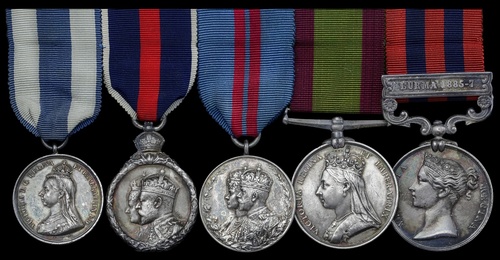
Auction: 19003 - Orders, Decorations and Medals
Lot: 164
A fine Second Afghan War and Burma Operations group of five to Lieutenant-Colonel A. W. H. Hornsby-Drake, 1st Madras Light Cavalry, late 4th Madras Native Infantry and 19th Foot, who commanded a squadron during the vital relief of Kushdil Khan in August 1880
Jubilee 1897, silver; Coronation 1902, silver; Coronation 1911, unnamed as issued; Afghanistan 1878-80, no clasp (Cap: A. W. H. Hornsby. 1st M. Lt. C.); India General Service 1854-95, 1 clasp, Burma 1885-7 (Major A. W. H. Hornsby M.S.C.), mounted in ordinary style as worn, sold with the recipient's mounted group of dress miniatures, minor contact marks, good very fine, housed in a Spink & Son velvet-lined leather case of issue (10)
Alfred Weston Hatchell Hornsby was born on St. Helena on 30 November 1845. He was gazetted to the 19th Foot (Green Howards) as an Ensign on 20 September 1864, transferring to the 4th Madras Native Infantry on 21 September 1869. On 26 July 1876, following an appointment to the Staff Corps, he became a Squadron Officer in the 1st Madras Light Cavalry. He rose to Squadron Commander on 26 November 1877, and after three months' furlough (Allen's Indian Mail, 18 November 1878) he served in this rank during the Second Afghan War.
The 1st Madras Light Cavalry, with Lieutenant-Colonel E. M. Cherry in command, left Secunderabad on 19 April 1880 and made for Kandahar via Bombay and Karachi. Reaching Jacobabad on 5 May, they were joined six days later by a squadron of the 2nd Madras Light Cavalry under Captain W. B. Warner. The combined force entrained for Sibi on 22 July, with orders to proceed rapidly to Kandahar amid rumours of attacks by Afghan tribes. Progress was hampered by the column's transport arrangements. The 350 pack-bullocks supplied to the troops were completely unbroken, and though six men were assigned to each animal, it proved a herculean effort to load them with kit. When the column reached Quetta on 3 August, only 80 bullocks still accompanied it.
During the march Cherry received a worrying report from the Officer Commanding at Kushdil Khan, where the small British garrison was threatened with encirclement. The 1st Madras Light Cavalry raced to Kushdil Khan, arriving there on 7 August. News of their approach had deterred the Afghan tribesmen from attacking the town. Instead, the enemy plundered a nearby village before melting into the landscape. The regiment remained part of Kushdil Khan's garrison until 18 October 1880. It then received orders to return to Quetta, and from thence down the Bolan Pass to Muskoff, Sibi and Thulli. Cherry posted small vedettes throughout the Marri country during the last phases of the conflict, until relieved by the Sind Horse on 27 April 1881. Continuing its march, the regiment reached Bangalore, Madras on 15 May 1881, having been on active service for one year and twenty-five days.
Hornsby then served as Adjutant on the Staff Corps during the Burma operations of 1885-87. On 2 July 1887 he married Ella Katherine Hillas Drake, adopted daughter of Sir William Richard Drake of Weybridge, at St. Margaret's Church, Westminster. Fathering two daughters, he changed his name to Hornsby-Drake. In 1907 the family moved into Compton Bassett House, a 17th century manor in Wiltshire. In 2010 this property became famous as the country seat of entertainer & singer-songwriter Robbie Williams, who purchased it that year for a cool £8.5 million. After retiring from the Army on 29 September 1887 with the rank of Lieutenant-Colonel, Hornsby-Drake went on to serve in the Honourable Corps of Gentlemen-at-Arms until 1919. A cigar case reputedly owned by him, bearing the badge of the 1st Madras Light Cavalry, is held at the National Army Museum in Chelsea (1980-11-110).
Subject to 20% VAT on Buyer’s Premium. For more information please view Terms and Conditions for Buyers.
Estimate
£1,200 to £1,500
Starting price
£1000




